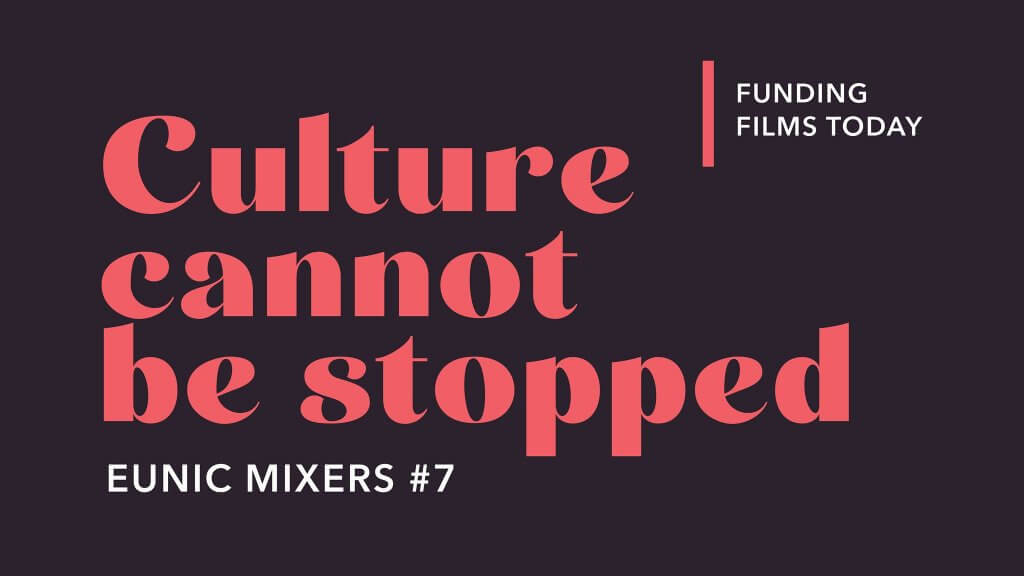
EUNIC MIXERS is a series of live, online discussions about the adaptations of the cultural sector to the changes during the pandemic, with guests from European countries, represented by the cultural institutes from the EUNIC Romania network, together with Romanian cultural practitioners. Event organized by EUNIC Romania and Insula 42.
The series “Salon Insula 42” launches informal dialogues with cultural professionals. The guests put into perspective the relationship between people and ideas, people and institutions, in Romania and in Europe. They talk, in an “imaginary salon”, about vocation and trades, cultural, social and political subjects, in a world that is radically transformed.
The 7th discussion focuses on the main changes impacting the film and audio-visual industry in Europe due to the COVID-19 situation, under the theme Funding Films Today. Which is the impact of closing cinema venues all over the world? What concerns and solutions do practitioners from the film industry have during this period? What appears to be the future of film festivals if isolation measures are prolonged? What are the consequences of the generalized use of VOD and streaming services on the production of European film? How is the TV entertainment industry impacted by the COVID situation? Representatives of European countries will discuss the funding films situation at the end of 2020, together with the moderator Corina Șuteu.
Guest speakers:![]() Radu Mihăileanu, a Romanian-born French film director and screenwriter. He left Romania in 1980 and graduated the IDHEC cinematographic institute in Paris. In addition to his work in the cinema he published a book of poems in 1987 titled Une vague en mal de mer. With Train de vie, his second full-length feature-film, won him international renown (oscar nominations for best script and best actor, the Fipresci prize at Venice, the People’s Choice Award at Sundance and the David di Donatello for best foreign film). Radu Mihăileanu was once again tempted by the wish to document history, and its descriptions of the Jewish villages in central Europe. He was declared ‘Chevalier de la Légion d’honneur’ (13 July 2013) and ‘Officier de l’ordre des Arts et des Lettres’ (16 January 2014), two of the highest decorations in France.
Radu Mihăileanu, a Romanian-born French film director and screenwriter. He left Romania in 1980 and graduated the IDHEC cinematographic institute in Paris. In addition to his work in the cinema he published a book of poems in 1987 titled Une vague en mal de mer. With Train de vie, his second full-length feature-film, won him international renown (oscar nominations for best script and best actor, the Fipresci prize at Venice, the People’s Choice Award at Sundance and the David di Donatello for best foreign film). Radu Mihăileanu was once again tempted by the wish to document history, and its descriptions of the Jewish villages in central Europe. He was declared ‘Chevalier de la Légion d’honneur’ (13 July 2013) and ‘Officier de l’ordre des Arts et des Lettres’ (16 January 2014), two of the highest decorations in France.
![]() Alexander Dumreicher-Ivanceanu, Austrian-Romanian film producer and chairman of the Austrian trade association of audiovisual media. In 1989, he starts to work as an independent film critic for Austria’s Public Radio Station ORF and several newspapers and film magazines. From 1992 on, he works as a distributor for Polyfilm Verleih, as a film programmer for movie theatres and as a curator for film festivals in Germany, Switzerland, France, Luxembourg and Austria. From 1994 to 2000 he’s co-managing director of the distribution company Danube Entertainment (Munich). In 1995, Dumreicher-Ivanceanu and film director Bady Minck create the production company AMOUR FOU Luxembourg and, in 2001, AMOUR FOU Vienna. The two branches company realise artistically exceptional feature, documentary and short films for the international market with international and, most frequently, European partners.
Alexander Dumreicher-Ivanceanu, Austrian-Romanian film producer and chairman of the Austrian trade association of audiovisual media. In 1989, he starts to work as an independent film critic for Austria’s Public Radio Station ORF and several newspapers and film magazines. From 1992 on, he works as a distributor for Polyfilm Verleih, as a film programmer for movie theatres and as a curator for film festivals in Germany, Switzerland, France, Luxembourg and Austria. From 1994 to 2000 he’s co-managing director of the distribution company Danube Entertainment (Munich). In 1995, Dumreicher-Ivanceanu and film director Bady Minck create the production company AMOUR FOU Luxembourg and, in 2001, AMOUR FOU Vienna. The two branches company realise artistically exceptional feature, documentary and short films for the international market with international and, most frequently, European partners.
Moderator:
Corina Șuteu – Passionate about the emerging and controversial disciplines of cultural management and cultural policies, Corina Șuteu is an international cultural consultant, president of Film ETC. and curator of the Insula 42 space, together with her closest collaborators. For 9 years, she was the director of the European Master’s degree in Cultural management of the Business School in Dijon. In 1995 she initiated the first regional training program in cultural management for Eastern European professionals, the ECUMEST program. Corina Șuteu was Romania’s Minister of Culture from May 2016-January 2017, following a mandate of State Secretary from January-May 2016, championing the adoption of a new cinema law in support of Romanian cinema production, distribution and audience development, as well as advancing reforms in the field of performing arts institutions and heritage, including advancing the enlisting of the Rosia Montana site on the UNESCO World Heritage Site List.
From 2006 to 2012 she was the Director of the Romanian Cultural Institute (RCI) in New York. She also held the presidency of the network of European Cultural Institutes in NYC (EUNIC) in 2010. She is author of “Another brick in the wall. A critical review of cultural management education in Europe” (Boekman Foundation, Amsterdam, 2006) and of numerous articles and studies.
Friday, December 11, 4 p.m. (Bucharest time). The discussion will be in English.